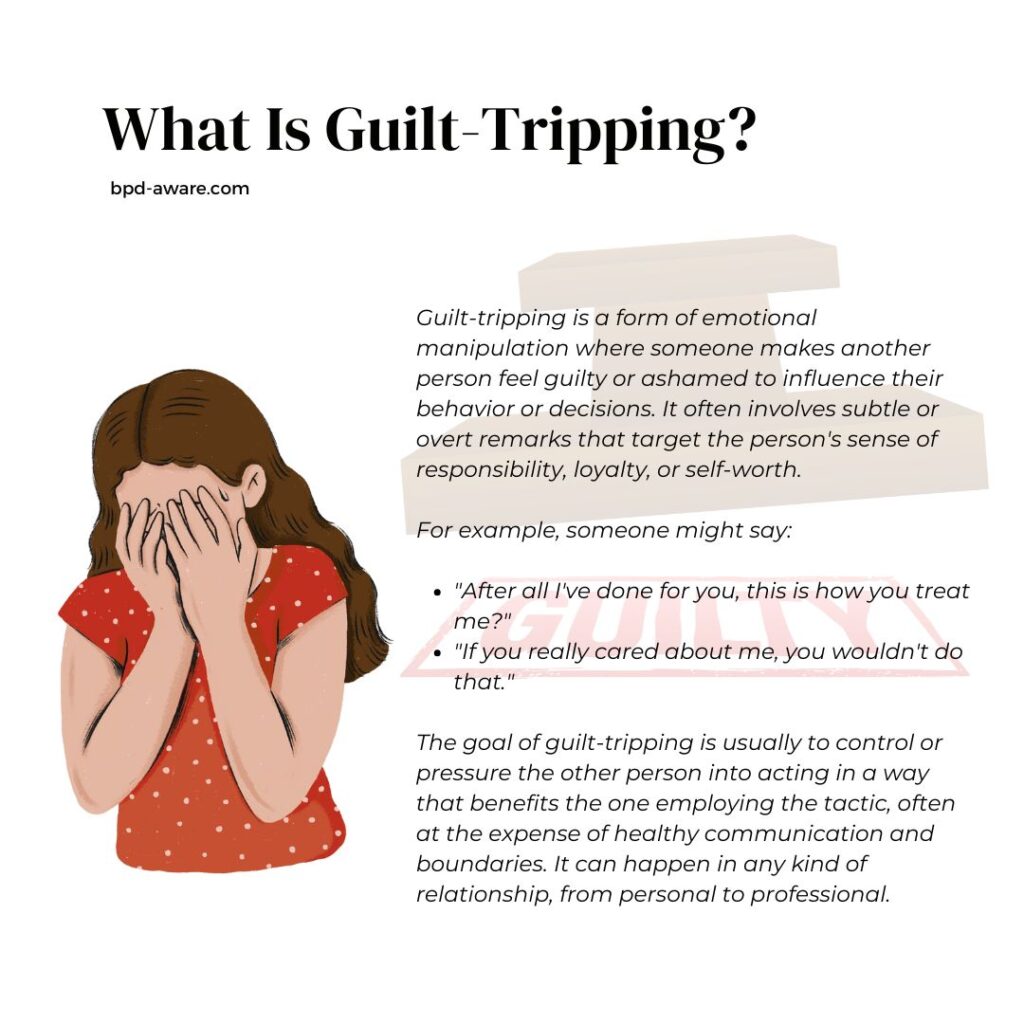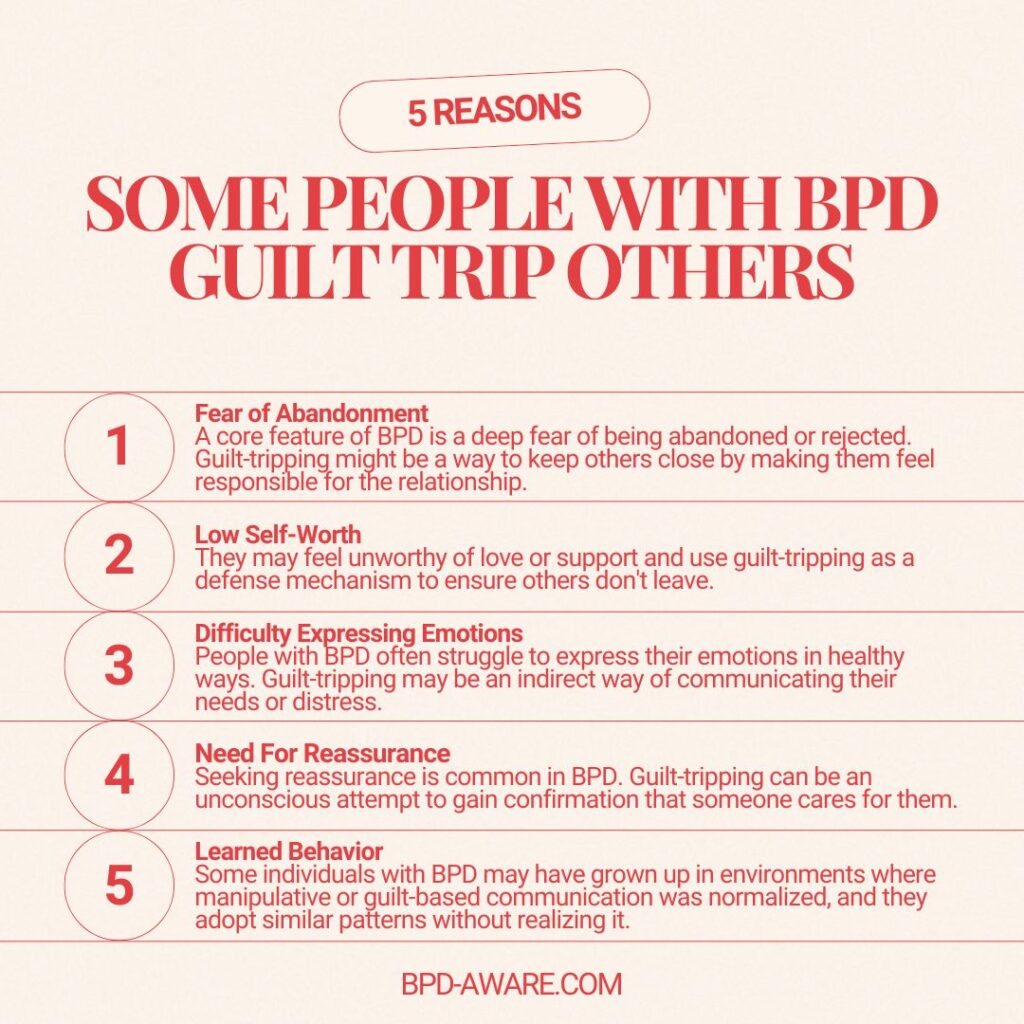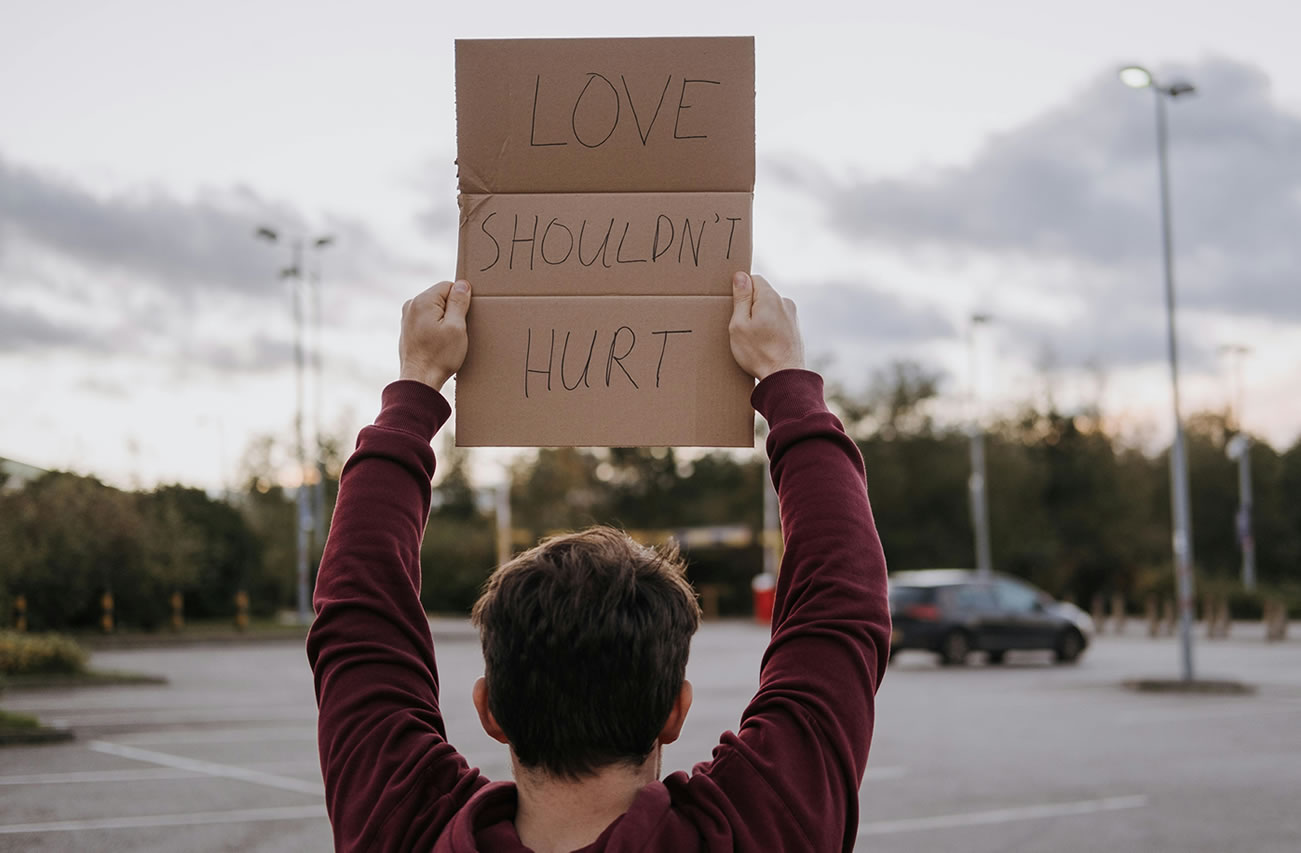Borderline personality disorder (BPD) is a condition that’s challenging to live with. Some of the common symptoms of BPD include emotional dysregulation, anger management issues, unstable relationships, and a shifting sense of self-image. BPD is a condition that can make every day feel like an emotional roller coaster, full of so many ups and downs that it makes you feel sick.
As difficult as it can be to live with BPD, it can also be immensely challenging to live with someone who has BPD. Whether you’re literally living with them or they’re just a part of your life, having a loved one with BPD presents its own unique set of challenges.
One of those challenges is dealing with the “BPD guilt trip” aka guilt-tripping. Guilt-tripping is a manipulative behavior that many people have employed at least a few times over the course of their lives. However, some people with BPD can employ the guilt trip often and in a majorly toxic manner.
In this article we’ll delve into what constitutes a BPD guilt trip, the reasons why someone with BPD might employ this manipulative tactic, how to recognize the signs of guilt-tripping, and how to defend yourself against a guilt trip.
Let’s begin.
Understanding Guilt-Tripping
At its most basic level, guilt-tripping is a tactic whereby an individual attempts to make someone else feel guilty, remorseful, or generally negative, to impact how they think, feel, or act.
For example, let’s imagine two people live together and take turns cooking the evening meal. It’s Person A’s turn but they don’t want to do it because they feel tired. Rather than just asking Person B to do it and offering to do double duty over the next couple of days, they might say something like:
Person A: I know it’s my turn to cook tonight but you broke my favorite cup last week so I think you should cook tonight to make it up for me.
Here, Person A is trying to make Person B feel bad over something that was likely an accident and get what they want out of the situation. Person A is leveraging the natural human desire of Person B not to feel bad about their actions.
As mentioned earlier, many people employ guilt-tripping occasionally to get what they want. It’s not healthy behavior but, when done rarely, it likely won’t cause much harm to a relationship. The problem is when guilt-tripping becomes a regular feature of a relationship, which can certainly happen in relationships with people who have BPD.
It’s important to note guilt-tripping isn’t BPD-specific behavior but can be more prevalent than normal among people with BPD.

Why Some People With BPD Guilt Trip Others
So why is it that someone with BPD is more likely to employ manipulative behavior to get what they want? The answer lies in the symptoms of the disorder as well as some of the experiences people with BPD often share.
First is the fear of abandonment. The fear of abandonment is perhaps the most pervasive issue among people with borderline personality disorder. If someone with BPD feels like someone in their life is pulling away from them, whether this is real or merely their perception, they may employ guilt-tripping as a way to keep the person tied to them.
Next is emotional dysregulation and how it affects relationships. Most people with BPD experience rapid and intense mood swings on a regular basis. This makes mood and emotions difficult to control, especially in a healthy manner. So when someone with BPD feels hurt, betrayed, or insecure, they feel a loss of control. Guilt-tripping is a way to regain control.
Black-and-white thinking aka splitting can also be a reason people with borderline personality disorder use manipulative tactics such as the guilt trip. During a splitting episode, the person with BPD may feel like someone in their life is “bad” or even “evil” and use guilt-tripping as a way to get back at them or punish them.
While some guilt-tripping is done consciously in this way, sometimes it is done unconsciously because the person with BPD has difficulty discussing their needs healthily. Manipulation tactics can be a maladaptive way of expressing unmet needs. Likewise, it can also be learned behavior. Many people with BPD grew up in unstable environments and may have themselves been frequent victims of guilt trips. Manipulation can be the only way people know how to communicate when they grow up in unhealthy environments.

Recognizing The Signs of Guilt-Tripping
The first step to defending yourself against the BPD guilt trip is to recognize the signs of one. If you come across any of the following examples, buckle up because you are likely on a guilt trip.
Flipping the script: One of the classic signs of a defensive guilt trip is when they try to flip the script on you. This is when they’ve done something bad to you, but rather than apologize or take the blame, they flip it back on you and try to make it YOUR fault. “Of course, I cheated on you. You never give me enough affection!”
Playing the victim: Some people manage to find a way to make themselves out to be the victim, no matter the situation. This can involve flipping the script (see above) or maybe a “woe is me” play. This person “always” has bad things happen to them and it’s “never” their fault. What they’re really hoping for though is that you’ll feel sorry for them and treat them especially well, even in situations where they’re clearly in the wrong.
After all I’ve done for you!: This one is a classic, especially among parents with BPD. If you refuse to do something they’ve asked of you, even if you have incredibly valid reasons for doing so, they’ll throw everything they’ve ever done for you back in your face. These people often remember every little thing they’ve ever done for you and completely forget everything you’ve done for them, no matter how large.
Frozen in time: Remember that time you made one mistake in your relationship with the other person? Well, they sure do! I like to call this one “frozen in time” because these people will never let it go. Whenever the guilt-tripper wants anything from you, they’ll be sure to remind you of that past mistake. They may claim they’ve forgiven you, but they sure haven’t forgotten.
Silent treatment: The person guilt-tripping you might not even tell you what you’re supposed to have done wrong. Instead, they’ll give you the silent treatment or avoid you altogether, leaving you to wonder what you could have possibly done. People with BPD can sometimes perceive things in a very warped manner, so there’s a good chance you’ve done nothing wrong at all. But your mind will race with possibilities until you convince yourself you’re in the wrong and offer to do anything to make it up to them.
The blame game: If you find yourself being blamed for something you didn’t do or weren’t thinking, then you’re a victim of the blame game…and you’re on the losing side! You might be accused of “never being there for me” or hit with “someone broke this and it wasn’t me!”
How To Counter Guilt-Tripping
Now that you better understand the hows and the whys of the BPD guilt trip, it’s time to look at how to defend yourself against this manipulation.
Identify that you’re being guilt-tripped: Once you recognize that someone is trying to manipulate you, it takes away a lot of its power. It can still feel bad but once you understand what’s going on, you can quickly gain control of the situation.
Don’t take it personally: Once you recognize that someone with BPD is trying to guilt trip you, try not to take it personally. It’s not an issue with you, it’s an issue with them.
Learn to say no and set boundaries: Many people with BPD respond surprisingly well to agreed-upon boundaries. By telling them you won’t let them make you feel bad about yourself for no good reason and setting an appropriate consequence for that kind of behavior, you’re letting them know that they need to find a better way to express themselves.
Ask questions and listen to their feelings: Choose a moment when things have cooled off, sit down with your loved one, and ask some questions about the situation that caused them to start the guilt trip. What were they thinking and feeling at the time? Sometimes there are things you both could have done better to avoid misunderstandings and hurt feelings. Or, if their imagination ran away with them, you can calmly explain that they don’t have anything to worry about and perhaps help them learn to express themselves in a healthier way next time.
Seek professional help: If your loved one with BPD isn’t already seeking professional help then you should encourage them to do so. BPD is treatable and therapy like dialectical behavior therapy can help them to learn how to communicate and conduct themselves in a manner that will strengthen their relationships rather than weaken them.
You might also want to consider therapy for yourself if being guilt-tripped has had a significant impact on your mental health.
Final Thoughts
Guilt-tripping is a manipulative behavior that most people employ occasionally. However, the frequent use of guilt-tripping is toxic to any relationship and will only ever weaken bonds rather than strengthen them.
Some people with BPD can engage in guilt-tripping as a defense mechanism, particularly to protect themselves against their fear of abandonment. It can also be a learned behavior from manipulative parents as many people with BPD grew up in unhealthy environments. While this doesn’t excuse manipulative behavior, it does go some way to explaining it.
Once you learn how to read the signs that you’re being guilt-tripped, it becomes much easier to defend yourself against. By depersonalizing the experience, holding an honest dialogue with the other party, and setting boundaries, you can go a long way to reducing or even eliminating this sort of manipulative behavior.
Of course, things don’t always go so neatly in real life. There may be times when you have to say “Enough is enough” and significantly change the scope of the relationship or end it altogether.
Remember: Your mental health is just as important as their mental health and it’s perfectly valid to distance yourself from someone who repeatedly has a negative impact on you.
Sources, Resources, and Further Reading
- Guilt-Tripping: How to Recognize and Deal with It: https://www.psychologytoday.com/us/blog/a-funny-bone-to-pick/202406/guilt-tripping-how-to-recognize-and-deal-with-it
- How To Stop Guilt-Tripping: https://www.calm.com/blog/how-to-stop-guilt-tripping
- How to save yourself another pointless guilt trip: https://psyche.co/guides/endlessly-beating-yourself-up-wont-help-anyone
- Why the ‘Guilt Trip’ Comes Naturally (but Can Be Problematic): https://psychcentral.com/health/guilt-trip

















